- Home
- Elmore Leonard
Touch Page 2
Touch Read online
Page 2
Bill Hill said, "What's his last name again? I forgot it."
The good-looking black girl was quite thin and appealing in a sleeveless knit top, her little breasts pointing out. She said, "I don't know he has a last name."
"Are you in the program?" the young guy asked.
"You mean in AA?" Bill Hill said. "No, but this very close friend I mentioned is. Elwin Worrel? I met Juvenal over at Elwin's." Bill Hill waited.
It gave him a funny feeling. The two behind the counter seemed relaxed and friendly, not the least bit guarded; but to them he was an outsider. To be "in" here you had to be an alcoholic. The young guy said he could have a seat in there if he wanted and pointed to an empty reception room off the lobby where there was a piano, a fireplace, and hotel-lobby furniture that must've been sitting there thirty or forty years.
Bill Hill moved to the front windows of the reception room and looked out at the brewery that was across the Chrysler Freeway but seemed as near as next door. Above the red-brick complex was a giant sign that lit up red at night and said Stroh's Beer for all the alcoholics to see. It could make them thirsty, he bet. Or it could remind them of gutters and weeds and cold, vacant buildings. Bill Hill was wearing a yellow outfit today. Yellow-and-white-striped sport shirt, cream-yellow slacks, white belt, and white loafers. It was hot in here with no air conditioning. A dim, depressing place.
There he was, all yellow. And the priest appeared in a green-and-white warmup suit and sneakers. A couple of rays of sunshine in the musty old room, greeting each other by name, Bill Hill warming up, glancing at the windows and asking if that big Stroh's Beer sign was a temptation or a warning to the patients here. He meant to keep it light and chatty for a few minutes.
"The residents," Father Vaughan Quinn said, "they can look at the sign and think whatever they want, as long as they know they have three choices. Die, end up in a mental hospital, or quit drinking. It's their decision."
That wasn't keeping it light. Bill Hill said, "I'm afraid the only thing Elwin's trying to decide is which he likes better, Early Times or Jim Beam."
Another bad sign: the priest pushed up his sleeve to glance at his watch. He said, "Elwin's trouble, he knows he's an alcoholic, but he hasn't hit bottom hard enough to feel it."
That was a good lead. "Well, he's sure hitting other people fairly hard and doing a job on his house," Bill Hill said. He had a feeling he wasn't going to be asked to sit down, so he sank into a chair next to the big empty sofa, saying, "You know Virginia, Father?"
It was a mistake. The priest remained standing in his green-and-white outfit, gazing down at him now, a priest who played hockey and might've been a street fighter at one time. He could be a mean bugger, Bill Hill decided. A hip priest, graying hair over his ears, and with the look of a guy who could tell when you were bullshitting him, used to drunks lying to him, making excuses.
The priest said, "Sure, Virginia's been here."
There was a scar, forty-two stitches in his chin, from a blind-side meeting with a hockey puck, playing with the Flying Fathers. Bill Hill remembered that from the time he saw Father Quinn on a TV talk show.
"I understand she used to play the organ at your church," Quinn said.
See? The man knew things. Bill Hill smiled, shaking his head. "That was years ago."
"You're an ordained minister, aren't you?"
"I sell recreational vehicles, motor homes," Bill Hill said. "No, but I used to have a church--Uni-Faith. Actually it was an outdoor setup . . . amphitheater could seat fifteen hundred, we had a chapel, a gift shop kinda like Stuckey's . . . but what drew the crowds, we had the world's tallest illuminated cross of Jesus, a hundred and seventeen feet high with 'Jesus Saves' at the top in blue neon you could see at night all the way from Interstate 75."
"Around here?" Quinn asked, interested.
"No, outside of Dalton, Georgia. I moved the whole show up here and went bankrupt. But that's another story."
"Fascinating," the priest said.
"Virginia was our organist--yeah, you knew that." Bill Hill paused. "You must also know she recovered her sight."
"I understand you were there when it happened," Quinn said.
"And a fella from the Center here by the name of Juvenal," Bill Hill said. "Virginia thinks he performed a miracle on her."
Quinn didn't seem startled or even change his expression. He said, "That's interesting, but what's a miracle? Some pretty amazing things happen around here all the time."
"I don't know," Bill Hill said, "it could've been a jolt to her head. Unless you think this fella did it laying on hands."
"Is that what he did?" Quinn asked.
"Well, I'm using that as a figure of speech. We had a young prayer healer at Uni-Faith, Reverend Bobby Forshay, used to lay on hands, so to speak. He wasn't too good at it. But something touched Virginia Worrel. Her face was clean before it happened; I saw it. Then when I looked at her after there was blood on it--around her eyes, on her forehead. You hear about that part, the blood?"
"Maybe it was from her nose. She touched her face and spread it around." Quinn pushed back the elastic cuff of his warmup jacket to glance at his watch.
"She wasn't bleeding from her nose. Virginia says she didn't have any cuts at all, not even in her scalp."
"How about a hemorrhage behind the eyes somewhere--I don't know, we're out of my area," the priest said. "You wanted to talk to me about Elwin, is that right?"
"Well, he's part of it," Bill Hill said. "This Juvenal's the other part. I wondered if you discussed it with him, about Virginia?"
"Listen, we're gonna have to make it another time," the priest said, starting to turn away. "We've got a volleyball game scheduled and I'm late as it is."
"Maybe I could talk to Juvenal--"
"Sure, any time."
"You can understand, Father. A woman, a good friend of mine, was blind fifteen years and now she can see. Juvenal was there a few minutes--I saw him sit down on the couch with her--then he was gone. How come? Did he witness her sight restored and it scared him or what?"
"You'll have to ask him that." The priest was moving off. "He'll be glad to talk to you."
"They said he's not here today." Bill Hill was pulling himself out of the chair now.
"Come back any time." Quinn paused in the doorway. "And, hey, if you've got any clothes you don't need, bring 'em along. You look like a pretty snappy dresser."
Shit, Bill Hill said, standing alone in that dim reception room. A pretty snappy dresser.
He came back to the Center the next day with two doubleknit leisure suits and a pile of sport shirts, some hardly ever worn. He buzzed and they let him in, glad to see him again. They were sorry though, Father Quinn was in Toronto and Juvie was up in detox with a new arrival. Bill Hill waited more than an hour. When the switchboard checked detox, Juvie was gone and no one seemed to know where.
On the third visit Father Quinn was back from Toronto, but was out for the day, not expected to return until late. Juvie was around somewhere, they'd try to locate him. But somehow never did.
The place wasn't that big. Four floors including a gym and a swimming pool.
The day of Bill Hill's fourth visit Father Quinn was getting ready for a board of directors meeting. Juvie was out on a call; it would be hard to say when he'd be back.
Bill Hill said to the good-looking black girl, "You know what it's like, the feeling people are avoiding you?"
"Tell me about it," the black girl said.
"I don't know what it is," Bill Hill said, "everybody here's so nice and cooperative. But I don't seem to be getting anywhere." He leaned against the counter, tired.
"Some days are like that," the black girl said. "I know you been coming here--I'd like to give you Juvie's phone number but, you understand, anonymity is part of the deal, why it's called Alcoholics Anonymous?"
"You know him very well?"
"I'm not gonna tell you anything," the black girl said, "so don't ask."
But
why not? Waiting around, Bill Hill would begin to lose interest and then something like this--why all the mystery?--would perk him up. Why was Juvenal hiding from him?
He said, "Let me ask you a straight question, okay? How does a person get in this place? I mean an alcoholic."
"Put your name in, get on the waiting list."
"The waiting list--what if you're in bad shape?"
"They're all in bad shape," the black girl said. "But we're full up, hundred and thirty-seven as of today."
"How about, do you take women?"
"Yeah, there some women. Some young girls even."
"Is that right? How long's the wait?"
"About three or four weeks. Unless somebody comes and they're desperate, I mean really in bad shape," the black girl said. "We don't turn people away, anything like that."
"I hope not," Bill Hill said.
Was he learning anything? Maybe. He was tired of waiting around. What he felt like right now was a drink.
He stopped off at the Athens Bar in Greektown and called Lynn Faulkner. The phone rang seven times. When she answered, Bill Hill said, "You know something, this is the first time I haven't had to talk to that recording. You know what it's like talking to somebody that isn't there?"
"Say it," Lynn Faulkner said, "I'm in the tub. I wasn't even gonna answer."
"You got a phone in there with you?"
"Listen, you want to call me back? I'm afraid I'm gonna get electrocuted."
"Get dressed and I'll take you out to dinner."
"Can't do it. I just got finished with Artie and a bunch of shitheads from L.A. and I'm not putting shoes on for anybody."
"Well, you're gonna have a couple, aren't you? Help you relax?"
"How come those guys in the business, no matter where they're from they all sound like they're from New York?"
"What guys?"
"You can bring some Asti Spumante if you want," Lynn said. "Cold, okay?"
"Now you're talking," Bill Hill said. "I got something interesting to tell you about. In fact, listen, it could even change your life."
Bill Hill thought he was kidding.
Chapter 3
LYNN MARIE FAULKNER left Uni-Faith in 1968, a few months before Bill Hill moved the 117-foot cross of Jesus from Dalton, Georgia, to Flat Rock, Michigan. Lynn didn't think too much of living up north. Burrr, she said, too cold for a Miami girl. Lynn had a lot of cute ways about her then.
The reason she left Uni-Faith though, age nineteen and at the peak of her baton-twirling career, was to marry Doug "Whiz" Whaley, veteran saddle bronc rider with the Longhorn World Championship Rodeo. It was funny that when she finally divorced Doug last year--1976 being a year she would always remember--the rodeo was in Michigan, performing at the Pontiac Silverdome.
Doug Whaley, one-time saddle bronc rider turned calf roper, should have known the day would come. All he said, stepping into the Li'l Hobo travel trailer 2:30 in the afternoon and seeing no dishes and bread on the table, was, "Where's my dinner? You know I'm competing tonight."
He should have looked at his little girl first and tried softer words to get his chuck on the table. Instead, he walked into it dumb arrogant, head fuzzed with booze, and his peevish tone set off the charge.
Lynn said, "That's all, buddy. You get the trailer and I take the car. That's the division of property, and if you don't like it come by Oakland County Circuit Court for the hearing. You can listen while I tell the judge what a first-prize asshole you've been eight out of the past eight and a half years.
Lynn already had a lawyer and the prospect of a job in the music business; so she decided to stay around and get a no-fault Michigan divorce. Once she'd made up her mind, there was no reason to change it or feel guilty. The situation was clear-cut.
Doug drank and he fooled around, not saving a whole lot for Lynn. He sat a horse and could look at a young girl and make her shiver. But behind that rawhide hell-rider image was usually a half-drunk, stove-up Absorbine Junior freak. Whiz the fiz in the sack, all talk and no action. Doug could take his limp pecker and his Li'l Hobo trailer and see if he could connect them up somewhere else; Lynn was through.
A lot of little things broke down their so-so marriage, nearly all under the heading of Doug's immaturity. While Doug was looking at himself in back-bar mirrors, Lynn was growing up. She read all the time: back issues of National Geographic, popular novels, Ms, Viva, WWD, Rolling Stone, books on self-improvement--how to free yourself of guilt, fear, resentments and find the real you--and, by some lucky turn, The Portable Dorothy Parker, the pages becoming limp and dog-eared as she learned, with relief, it was all right to laugh at most serious things. She found out she was a pretty bright girl besides having a nice nose and a perky little behind, way smarter than Doug and too alive and eager to be his Dale Evans. Lynn had to get out while she still had a future.
A PR man at the Pontiac Silverdome, a really nice guy, got her a job in the advertising department of Creem, "America's Only Rock 'n' Roll Magazine," located above some storefronts in Birmingham--a swanky little Detroit suburb--and not like any business offices she had ever seen or heard of, with people walking around barefoot in cutoffs and tank tops. It was fun being in the world of commerce and rock and roll. Lynn sold KMA Records on a third-cover, four-color, twelve-insertions deal, and KMA hired her away from Creem as their Detroit-office publicist and record plugger at seventeen five a year plus a car and expenses. She called up her old buddy and former boss, Bill Hill, told him about it, and said, "Hey, not bad for a little Uni-Faith baton twirler who didn't know her ass from a hymnbook. Neat, huh?" Bill Hill said, "Not bad at all, honey. It's nearly as much as I make and I'm old enough to be your uncle."
That was nine months ago, when Lynn Whaley first got the job with KMA Records out of L.A. and was using her maiden name again, Lynn Faulkner, without the Marie.
Seventeen five plus a car and expenses, it sounded great. Except there was no KMA Detroit office. She'd have to work out of her own place, with an answering service or message recorder.
Well, that was all right. Maybe even better. She got an apartment in Somerset--a suburban complex with swimming pools, tennis courts, and a golf course, supposedly full of swinging singles--two bedrooms and a balcony overlooking the ninth fairway for three ninety a month, half of which she could write off as a business expense.
The car was a dull green Chevy Nova they must have bought second-hand from the post office. Lynn had to buy an AM-FM radio out of her twenty-cents-a-mile allowance.
Lynn said to Artie Rapp, the KMA publicity director in from L.A., "I'm supposed to take DJs out in that turd?"
Artie Rapp said, "Take them where? To your place? They have cars. All you got to do is see that KMA releases are played on the air. Check Peaches, Harmony House, Korvettes, see that KMA releases get good display and're selling. Meet the different KMA artists when they come to the Motor City, get them interviewed and fixed up and all, and do a little advance work on concerts and special promotions. What do you need for that, a Rolls Silver Cloud?"
"What do you mean 'fixed up and all'?"
"Sources. A band comes to town, say the Nightstalkers," Artie Rapp said, "they got their roadies, their groupies, all that. But say they want some good Colombian. That's all I'm talking about. Or they need some equipment or where's the best ribs in town--shit like that, nothing big. A group's in town you spend a little extra time with them. Otherwise you're what, twenty-seven hundred miles from the home office working out of your own pad with a generous expense account. You know how many people in the business would trade places with you?"
"How many?" Lynn said.
"I'll tell you what. There any good places to eat in this town I'll treat you to a nice dinner," Artie Rapp said, with his feet on Lynn's glass coffee table. "But since we're here--huh?--and we're gonna be working together . . ."
Lynn could handle Artie and she got along fine with people in the business, the station music directors and DJs, because she came on straig
ht and didn't waste time giving them a lot of shuck and jive to get a KMA release on their play lists. If she really liked the record she might hustle it with a little extra effort, but without ever getting hyper about it. Any payola arrangements, if they were made, were left to Artie. Lynn kept her nose clean, offered no inducements, and was not sleeping with any of the local DJs. At twenty-nine going on thirty she was older than most of the rock and roll DJs in town, but didn't seem to turn any of them off, not even in this youth-oriented business. Lynn had a neat nose, bedroom eyes, and a slim little figure.
She wore her blond hair layered back and feathered fairly short, pasted on twenty-dollar eyelashes, rubbed in a cheek gloss for that natural look, and painted her nails light brown. Artie told her she had a killer body, wishing he could see it in person beneath the hip-huggers and India cotton shirt. He'd demonstrate that she was just the right size. See, at five eight he was the average height of the American fighting man in World War II and his mouth, look, was just even with Lynn's nose when she had her clogs on. Artie maneuvered for nine months and never made it.
DJs who wanted to get it on with Lynn would give her a sleepy look in a hang-out bar and say, "You want to get it on?"
Lynn might say, "I better tell you, I'm a very religious person basically and when I do it I have to be in love or it just doesn't work. I guess it's the way I was brought up."
If the DJ pressed and said, "So let's fall in love," Lynn would say, "You know where it is? It's in the grooves. That's the bottom line. If my record's any good you'll play it and it'll sell and my balling you won't make the least bit of difference, will it?"
The guys in the business found out the platter-chatter hip approach wasn't going to make it with Lynn. She was a very laid-back young lady, not some trendy little chick who was easily impressed. Though she did have her weak moments.
Lynn had an affair with a TV news man until his hairdo, which was like a brownish-gray helmet, finally unnerved her. They would smoke grass and thrash around in bed half the afternoon and the guy would come out of it with every hair still glued in place for his six o'clock newscast. Lynn felt either she couldn't bring out the real person beneath the hard charm or there was none there to begin with.

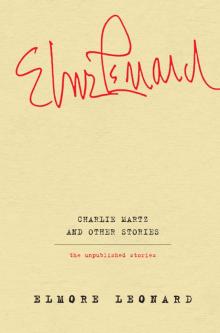 Charlie Martz and Other Stories: The Unpublished Stories
Charlie Martz and Other Stories: The Unpublished Stories Elmore Leonard's Western Roundup #2
Elmore Leonard's Western Roundup #2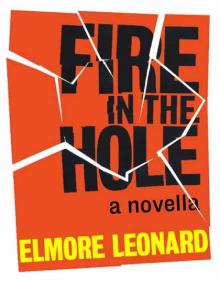 Fire in the Hole
Fire in the Hole Tishomingo Blues (2002)
Tishomingo Blues (2002)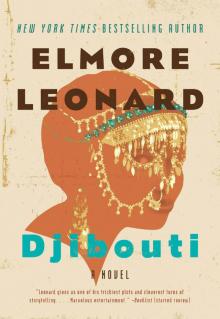 Djibouti
Djibouti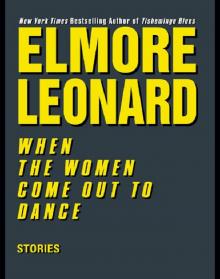 When the Women Come Out to Dance: Stories
When the Women Come Out to Dance: Stories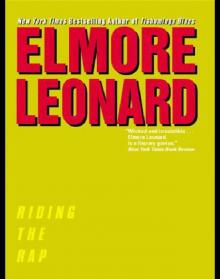 Riding the Rap
Riding the Rap Moment of Vengeance and Other Stories
Moment of Vengeance and Other Stories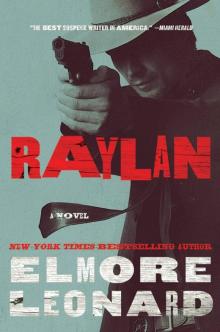 Raylan
Raylan Touch
Touch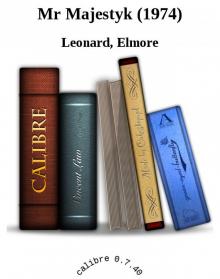 Mr Majestyk
Mr Majestyk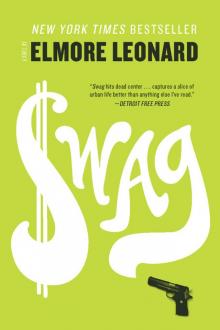 Swag
Swag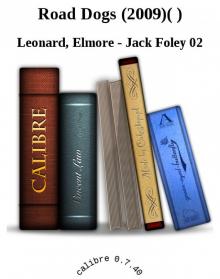 Road Dogs
Road Dogs La Brava
La Brava The Hot Kid
The Hot Kid Valdez Is Coming: A Novel
Valdez Is Coming: A Novel Be Cool
Be Cool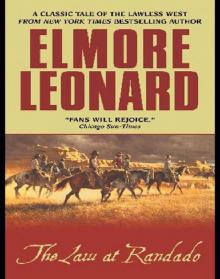 The Law at Randado
The Law at Randado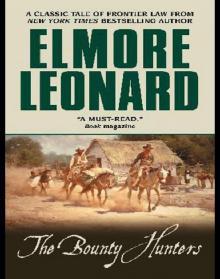 The Bounty Hunters
The Bounty Hunters When the Women Come Out to Dance
When the Women Come Out to Dance 310 to Yuma and Other Stories (1953)
310 to Yuma and Other Stories (1953)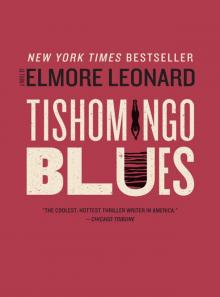 Tishomingo Blues
Tishomingo Blues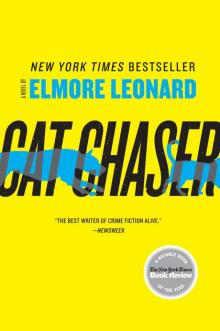 Cat Chaser
Cat Chaser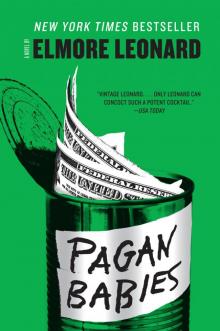 Pagan Babies
Pagan Babies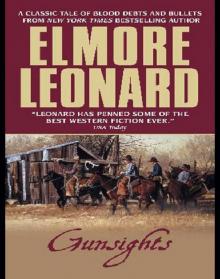 Elmore Leonard's Western Roundup #1
Elmore Leonard's Western Roundup #1 52 Pickup
52 Pickup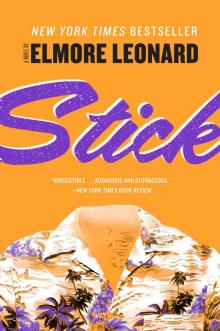 Stick
Stick The Moonshine War
The Moonshine War Valdez Is Coming
Valdez Is Coming City Primeval
City Primeval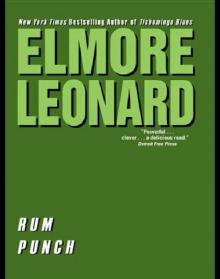 Rum Punch
Rum Punch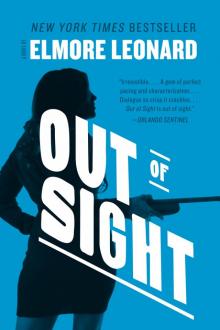 Out of Sight
Out of Sight Naked Came the Manatee (1996)
Naked Came the Manatee (1996)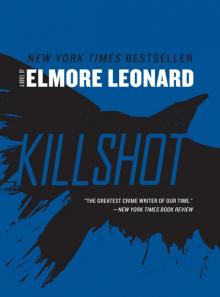 Killshot
Killshot Cuba Libre
Cuba Libre Forty Lashes Less One
Forty Lashes Less One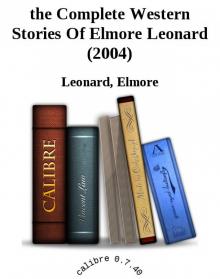 The Complete Western Stories of Elmore Leonard
The Complete Western Stories of Elmore Leonard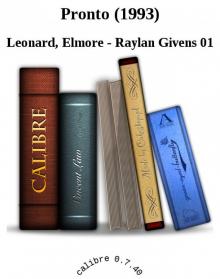 Pronto
Pronto Split Images
Split Images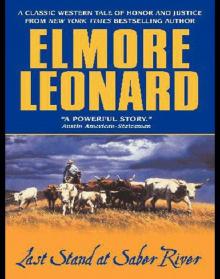 Last Stand at Saber River
Last Stand at Saber River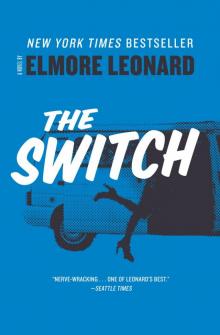 The Switch
The Switch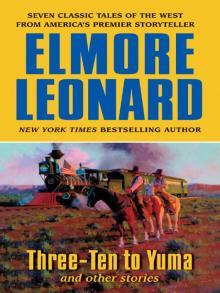 Three-Ten to Yuma and Other Stories
Three-Ten to Yuma and Other Stories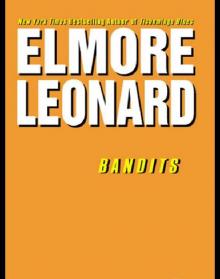 Bandits
Bandits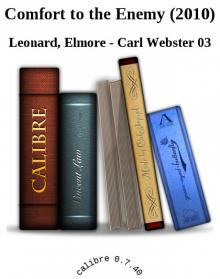 Comfort to the Enemy and Other Carl Webster Stories
Comfort to the Enemy and Other Carl Webster Stories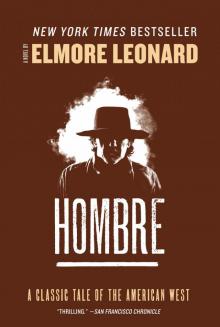 Hombre
Hombre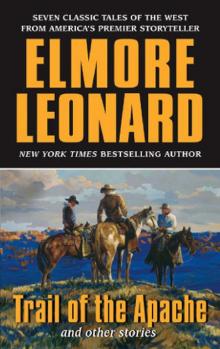 Trail of the Apache and Other Stories
Trail of the Apache and Other Stories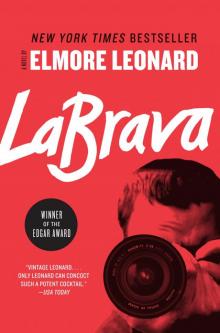 LaBrava
LaBrava Gold Coast
Gold Coast Jackie Brown
Jackie Brown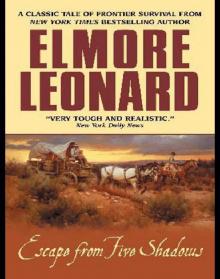 Escape From Five Shadows
Escape From Five Shadows Karen Makes out (1996)
Karen Makes out (1996)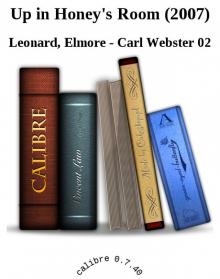 Up in Honey's Room
Up in Honey's Room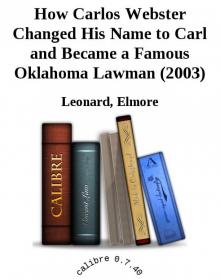 How Carlos Webster Changed His Name to Carl and Became a Famous Oklahoma Lawman (2003)
How Carlos Webster Changed His Name to Carl and Became a Famous Oklahoma Lawman (2003)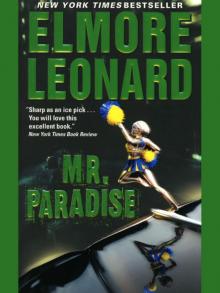 Mr. Paradise
Mr. Paradise The Hunted
The Hunted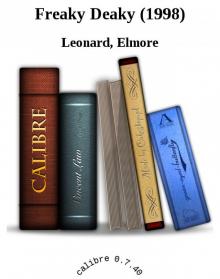 Freaky Deaky
Freaky Deaky Louly and Pretty Boy (Ss)
Louly and Pretty Boy (Ss)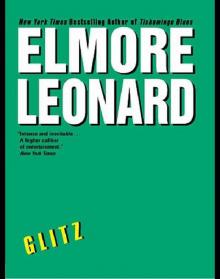 Glitz
Glitz A Coyote's in the House
A Coyote's in the House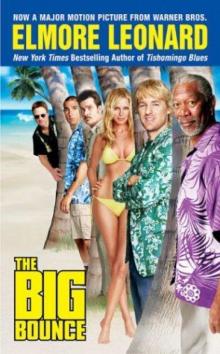 The Big Bounce jr-1
The Big Bounce jr-1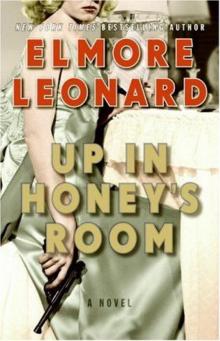 Up in Honey's Room cw-2
Up in Honey's Room cw-2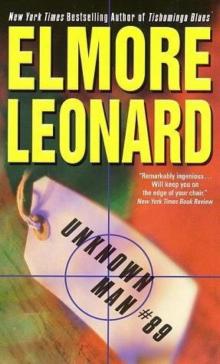 Unknown Man #89 jr-3
Unknown Man #89 jr-3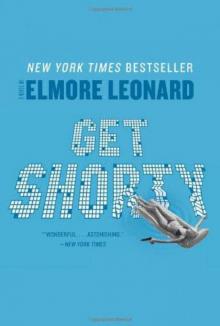 Get Shorty: A Novel cp-1
Get Shorty: A Novel cp-1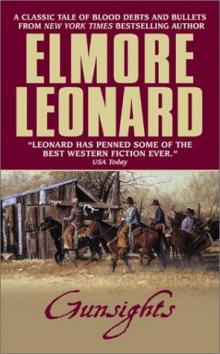 Gunsights
Gunsights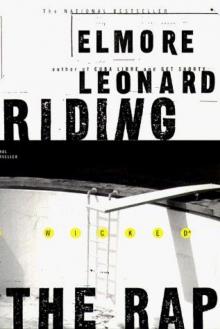 Riding the Rap rg-2
Riding the Rap rg-2